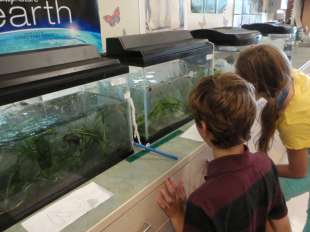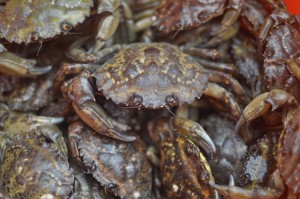 The Frenchman Bay Partners’ plan of restoring an additional 228 acres of eelgrass this summer had to be put on hold when it became clear that eelgrass was not coming back in the restoration areas that had been thriving for years. Not only that, many formerly healthy beds that had been growing at least since mapping began in 1996 were also lost this year. MDIBL’s Community Environmental Health Lab (CEHL) had to quickly change gears to begin studies on possible causes of the loss. Scientists and interns looked into the possibilities of “wasting disease” (the pathogen Labyrinthula zosterae) which caused devastation to the plant in the 1930s, nutrient deficiency in the sediment, temperature changes, and invasive green crabs. Continue reading
The Frenchman Bay Partners’ plan of restoring an additional 228 acres of eelgrass this summer had to be put on hold when it became clear that eelgrass was not coming back in the restoration areas that had been thriving for years. Not only that, many formerly healthy beds that had been growing at least since mapping began in 1996 were also lost this year. MDIBL’s Community Environmental Health Lab (CEHL) had to quickly change gears to begin studies on possible causes of the loss. Scientists and interns looked into the possibilities of “wasting disease” (the pathogen Labyrinthula zosterae) which caused devastation to the plant in the 1930s, nutrient deficiency in the sediment, temperature changes, and invasive green crabs. Continue reading
Category Archives: Partner Projects
Good news for mudflats: 610 Project receives funding, makes progress
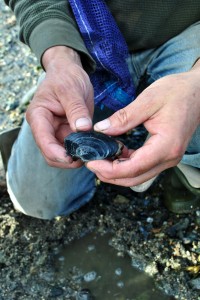
The 610 Project (pronounced six-ten) is a collaboration between the Partners, the Frenchman Bay Regional Shellfish Committee and the Hancock County Planning Commission to build capacity towards the goal of opening closed clam flats in Frenchman Bay. This project received its initial funding from the Maine Community Foundation’s Community Building Grant Program. Through a conservation action planning process, the Partners and shellfish committee have identified the five-year goal of opening all 610 acres of clam flats in Frenchman Bay in which harvesting is restricted due to unknown bacterial pollution sources. They will accomplish this by building capacity within the shellfish committee for watershed surveys and organizational development.
Lamoine Conservation Commission Records and Materials are now Available to the Public
Lamoine Conservation Commission has organized its records and materials and made them available to anyone who might like to use them for research or any other purpose. You can download the LCC Archives Overview, a general directory of what’s in the archives.
Hancock County Planning Commission completes Blue Hill Bay Needs Assessment
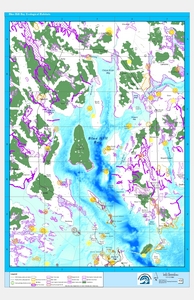 The Hancock County Planning Commission and consultant Barbara Arter, in partnership with the Friends of Blue Hill Bay, have completed the Blue Hill Bay Needs Assessment, a preliminary assessment of the environmental, economic, and social assets and needs of Blue Hill Bay Watershed. The report focuses on fisheries, recreation and tourism, water quality, and land use and development, and offers recommendations that promote the long term sustainability of Blue Hill Bay. Many land use maps were updated and new maps depicting ecological and economic features of the bay were created for the assessment. It is a comprehensive and informative report which Frenchman Bay Partners will refer to often.
The Hancock County Planning Commission and consultant Barbara Arter, in partnership with the Friends of Blue Hill Bay, have completed the Blue Hill Bay Needs Assessment, a preliminary assessment of the environmental, economic, and social assets and needs of Blue Hill Bay Watershed. The report focuses on fisheries, recreation and tourism, water quality, and land use and development, and offers recommendations that promote the long term sustainability of Blue Hill Bay. Many land use maps were updated and new maps depicting ecological and economic features of the bay were created for the assessment. It is a comprehensive and informative report which Frenchman Bay Partners will refer to often.
Go to the Hancock County Planning Commissions website to learn more about the project and its process, find links to resources and download the new assessment maps that were created, or download the full report here.
MDI Biological Laboratory needs help mapping eelgrass in Maine
Eelgrass in Maine is now closed to new submissions. To share what you’re seeing in the natural world, you can now create an account at CEHL’s new collaborative nature journal, Anecdata!
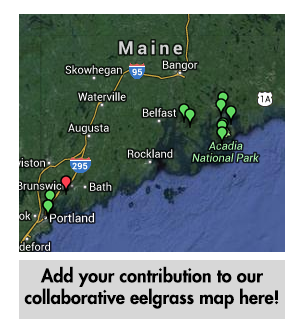 Scientists, interns, and volunteers at the Mount Desert Island Biological Laboratory (MDIBL) have been successfully restoring eelgrass in Frenchman Bay with community partners for six years. But this year, the marine plant didn’t come up, and not just in restored areas. Eelgrass throughout the upper bay didn’t seem to get its annual signal to send up shoots, and only rhizomes remain in the mud where eelgrass beds had been.
Scientists, interns, and volunteers at the Mount Desert Island Biological Laboratory (MDIBL) have been successfully restoring eelgrass in Frenchman Bay with community partners for six years. But this year, the marine plant didn’t come up, and not just in restored areas. Eelgrass throughout the upper bay didn’t seem to get its annual signal to send up shoots, and only rhizomes remain in the mud where eelgrass beds had been.
In order to find out the extent of this event along the coast of Maine, MDIBL is asking the public to look for eelgrass beds and report their locations, or where they missing from places where there had been beds in the past. The lab is asking people to search for the plant as soon as possible, because eelgrass’s growing season usually ends in August. Continue reading
Protecting Working Waterfront and Public Access
The Hancock County Planning Commission invites you to join them for the Protecting Working Waterfronts and Public Access workshop, which is addressing growth and development issues facing Hancock County. The June 27, 2013 workshop will focus on public access to the shore and the working waterfront.
VFW Hall, 419 Main Street, Ellsworth (locally known as Washington Junction Road) June 27, 2013 (6:00 p.m. – 8:30 p.m.)
Dinner begins at 5:00 PM, workshop begins at 6:00 PM, registration $18.00.
Downeast Fisheries Trail
The Downeast Fisheries Trail, a project coordinated through Maine Sea Grant, connects current and historic fisheries, weaving together pieces of Maine’s maritime heritage for visitors and locals alike.
Recently, there was a Downeast Fisheries Trail Celebration at the municipal building in Columbia Falls, ME on April 26th, 2013 to recognize each of the sites on the Trail, after which participants were invited to a Downeast Smelt Fry hosted by the Downeast Wild Salmon Federation. There were 40 attendees at the Celebration, representing two thirds of the sites on the Fisheries Trail. The Celebration was a great opportunity for site representatives to tell stories about each of their sites, and to hear about each of the other sites on the Downeast Fisheries Trail.
The Downeast Fisheries Trail Celebration will be featured in the May 2013 publication of the Frenchman Bay Partners E-Newsletter. For more information on the Downeast Fisheries Trail, please visit their website and like them on Facebook!
More information for sites on the Downeast Fisheries Trail is available here.
Lamoine Open Space Inventory
The Lamoine Conservation Commission recently published the Lamoine Open Space Report and Inventory in March of 2013. You can read it here: Lamoine Open Space Report 2013.
Blue Hill Bay Watershed Needs Assessment
The Hancock County Planning Commission recently published a draft of the Blue Hill Bay Watershed Needs Assessment in partnership with Friends of Blue Hill Bay. The purpose of the assessment is to identify the environmental, economic, and social needs and assets of Blue Hill Bay.
Click More information on the Blue Hill Bay Watershed Needs Assessment can be found here.
Seagrasses In Classes
“Seagrasses in Classes” is an academic year education program in five Mount Desert Island region elementary, and two inland high schools. The program is a school-year extension of the Mount Desert Island Biological Laboratory’s efforts to restore and study eelgrass (Zostera marina) beds in northern Frenchman Bay. Eelgrass is a native seagrass that grows underwater in thick beds just below low tide in sheltered coastal areas and in river estuaries. Eelgrass is an essential component of the coastal marine ecosystem. It offers protection to small fish and shellfish and buffers the ocean from intrusions of sediment and pollution. Scientists and interns affiliated with MDIBL’s Community Environmental Health Laboratory have established a restoration site near Hadley Point in Bar Harbor, and are studying the efficacy of different methods of eelgrass replanting, the broadcast of eelgrass seeds by currents, and the population genetics of eelgrass communities.

